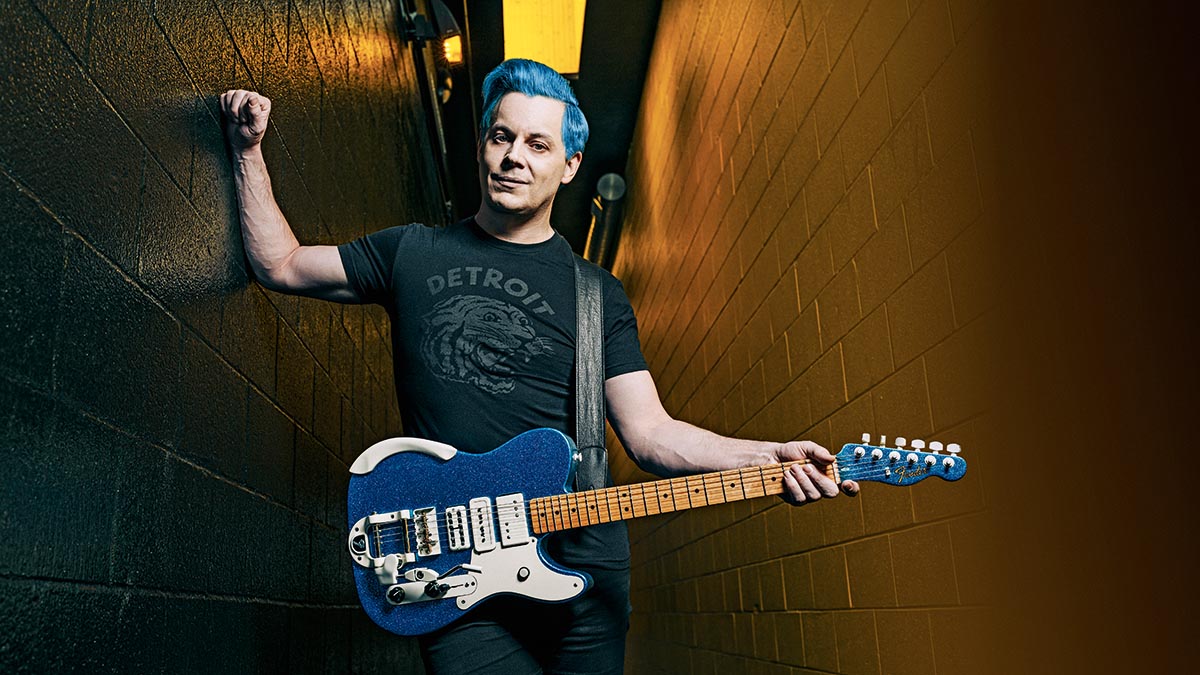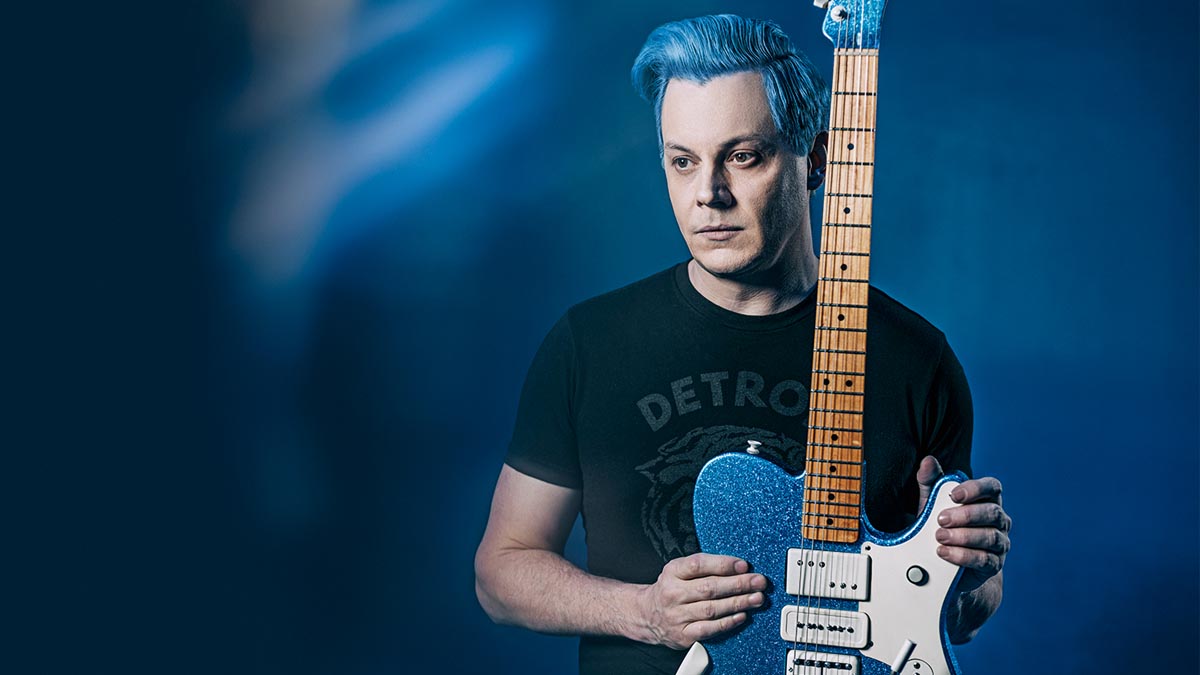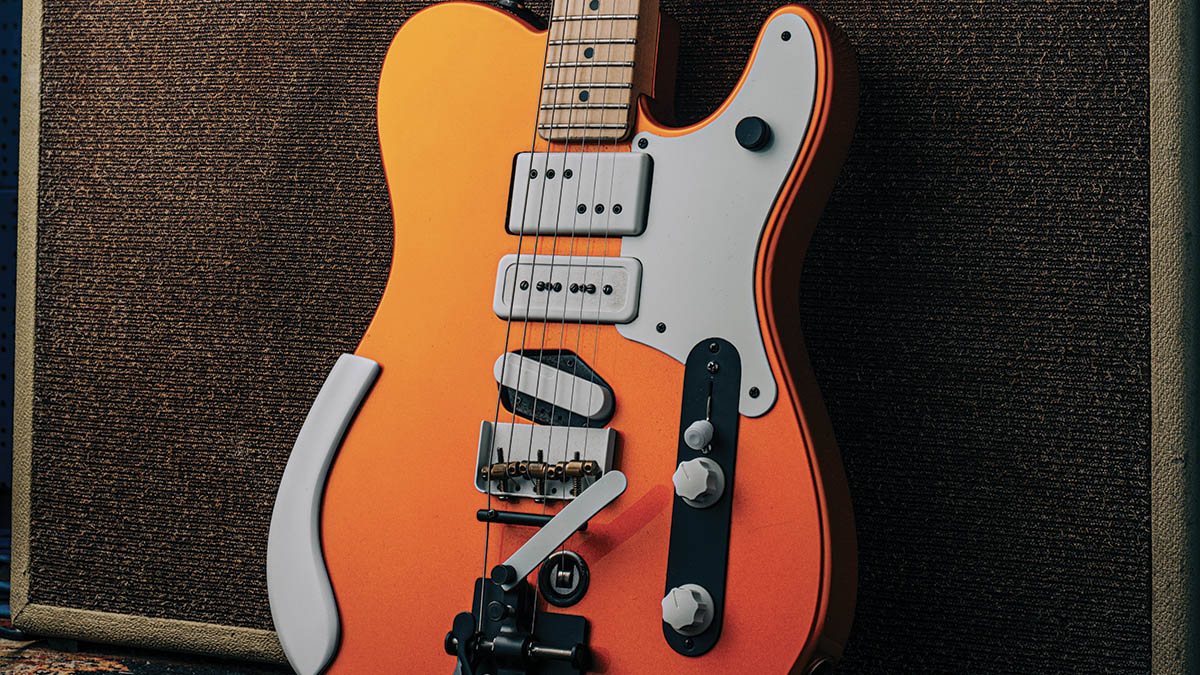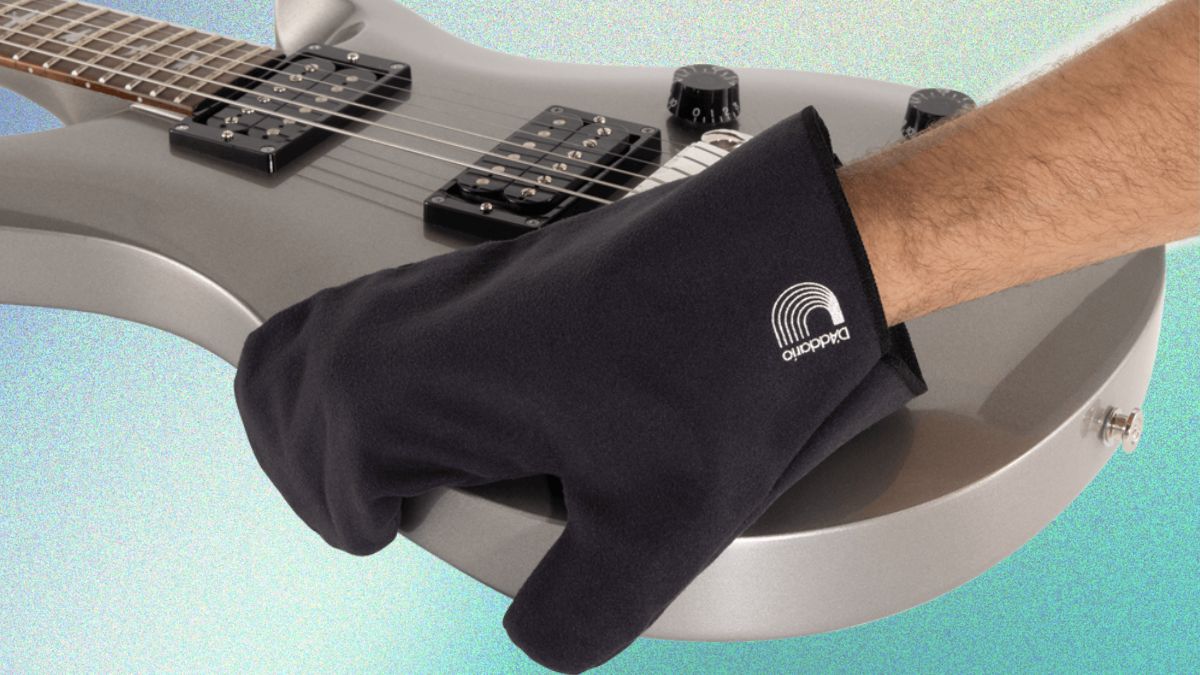Jack White: “I’m the proudest I’ve been in my life of my guitar playing. There are places I’ve never gone before... techniques I thought I wasn’t capable of doing”

All the latest guitar news, interviews, lessons, reviews, deals and more, direct to your inbox!
You are now subscribed
Your newsletter sign-up was successful
It is a big statement that Jack White is making this year – with the release of not one but two new solo albums. And yet, as the man himself says, this is not the result of some intensely calculated master plan. In fact, he had no plan at all...
“I know people won’t believe me when I say this, but I don’t really ever have a plan to make an album once I get involved in it,” he explains. “I always sort of start falling into it and find myself in the middle of it, and then I say, ‘Oh, wow. I guess I should start maybe thinking about this, how it’s going to relate to things I’ve done in the past, or what I want to do next live on stage.’
“But just as quickly, you can find yourself in a bunch of traps because you start overthinking the public version of what you’re doing, and that’s not a good place to create, really.”
Jack is speaking from his home in Nashville, where these new albums were written and then recorded at his Third Man Studios. He has made a couple of public appearances over the past few years, performing on Saturday Night Live in 2020, and playing two concerts in London last year to mark the opening of a new Third Man Records Store in the city’s Soho district.
But for the most part he has been laying low in Nashville as a result of the pandemic. And while he admits that the period of forced isolation affected him deeply, it was also a key factor in the sheer volume of new songs he wrote.
Once he had recorded all this material, Jack briefly considered packaging everything on one grand double-album set – an idea he quickly rejected. Instead, he divided the material into two thematic albums. With his previous solo record, 2018’s Boarding House Reach, he struck a balance between blitzing riff monsters and mellower songs that blended rustic country, folk and blues, but with the new albums he draws distinct lines of demarcation.
Fear Of The Dawn, released in April, features plenty of boisterous guitar action. It begins with three hellacious rock load-blowers – Taking Me Back, the title track and The White Raven, all of them brimming with bonkers solos.
All the latest guitar news, interviews, lessons, reviews, deals and more, direct to your inbox!
I like to play with other people to get someplace new. It brings out different personalities in the songs
Elsewhere on this album, What’s The Trick is a punishing hybrid of hip-hop and metal; That Was Then (This Is Now) fuses way-out acid funk with good-time 70s pop crunch; a version of Cab Calloway’s Hi-De-Ho – featuring guest vocalist Q-Tip and Black Belles guitarist Olivia Jean – has the jazz classic reimagined as unnerving psychedelia; and on the epic Eosophobia (Reprise), Jack answers the musical question: what would Steve Howe on steroids sound like?
The second of these albums, Entering Heaven Alive, follows on July 22, and it’s a different animal altogether. A more subdued, acoustic-laced work, it showcases a softer, quieter side to Jack White.
But even while he’s luxuriating in the acoustic pastoral elegance of A Tip From You To Me, evoking lush mid-’60s chamber pop on Help Me Along or laying his soul bare on a pair of aching ballads, Love Is Selfish and If I Die Tomorrow, there’s a restlessness and an overarching feeling of anxiety that runs through the album.
Recording with other musicians during on-again, off-again lockdowns proved tricky, and on much of his new music Jack handled the lion’s share of instrumentation himself – electric and acoustic guitars, bass, keyboards, percussion, vibraphone, theremin; you name it. But he nixed the idea of performing everything on his own.
“I just didn’t want to get into that concept,” he says. And so he waited until restrictions eased to call in an assortment of players for various tracks – chief among them drummers Daru Jones and Patrick Keeler, as well as bassists Dominic Davis and Jack Lawrence, all of whom he’s worked with in the past. “I like to play with other people to get someplace new,” he says. “It brings out different personalities in the songs.”
In a wide-ranging conversation, Jack talks about the whole creative process that went into these albums, from writing to production. He talks about the fun he’s had with guitars designed by Eddie Van Halen and St. Vincent. And he suggests that his playing on Fear Of The Dawn might just be the best he has ever laid down…
Let’s talk first about songwriting – and how you wrote enough for two albums...
“Songs were just coming out every day, and I was getting lucky. You start to hit a streak where several tracks keep pouring out. It’s funny because you don’t really know where they’re coming from, or why they’re coming, so when it’s happening it’s just best to get out of the way and let it happen.”

How much of this was the result of isolation during the pandemic?
“It’s been tragic for the entire world. The sadness of people dying and how this has disrupted everything – it’s left me with a whole new respect for the fragility of human life. At the same time, as an artist, to be put in that position where I was basically told, ‘You can’t leave your house,’ I found that inspiring.
“Constriction has always been something that turns me on and gets me motivated. That part wasn’t hard for me at all. It was actually a blessing, and it made me have a whole rebirth.”
How much time do you spend on a song before you decide if it’s good enough or not?
“If it doesn’t sound interesting very quickly, I quickly abandon it. Every artist is different, but for me, I know pretty fast whether there’s anything I can find some life in. Like riffs – every guy on the street can write a riff, but is it interesting to other people? It just comes down to taste, but along with that there’s how you execute it live or in the studio.
I don’t think I’m really that good at saying, “Oh, that’s a great song!” But I am good at knowing if it’s something I won’t enjoy playing live
“That comes down to taste, as well. Once you do all that, and you mix it and present it to people, are they going to get anything out of it? Who knows? The ability to quickly decipher whether something is interesting or not can’t be taught in school. You just have to have it in you, and I don’t really think I’m that good at it.”
You don’t?
“I don’t think I’m really that good at saying, ‘Oh, that’s a great song!’ But I am good at knowing if it’s something I won’t enjoy playing live. If it’s something I don’t get much out of when I listen to a mix, I get away from it and move on to something else.”
Do you ever bounce things off other people? Like, ‘Hey, I’ve got this song that I don’t know about. What do you think?’
“I bounce it off people once I think it’s interesting. The hardest part is playing things for somebody, like, ‘God, this sounds like a song somebody else already wrote. Does anybody know this song?’ I do that quite often.
“What sucks is when you play it for 15 other musicians and no-one recognises it, and then you release it and all these people start saying, ‘Oh, that sounds like blah blah blah.’ I’m like, ‘Oh, my God. Why didn’t somebody mention that?’ Because we’re living in an era where there’s been so much recorded music in the last, whatever, 70 years – it’s not like 1966, when only five guys had tried it.”
You’ve self-produced your records for quite some time. Do you ever think about using an outside producer to get another perspective?
“Yeah, I might do that in the future. Producers are good for people who don’t want to bother themselves with orchestration, arrangement, production, all that other stuff, and they just want to be a singer or a bass player or whatever.
Over the years, I’ve lost interest in producing other artists... it’s a lot more difficult because you have to understand that everybody wants something different from a producer
“That’s when a producer comes in handy. I’m actually more interested in the production and the direction of the stuff than I am of the actual performance part of it. For me, it’s like, ‘OK, I can do that. That’s not a big problem, but can I bring this to life?’ That’s what I’m more interested in.
“Over the years, I’ve lost interest in producing other artists as much as I used to. I used to do it a lot in the early days of Third Man Records, but it’s a lot more difficult because you have to understand that everybody wants something different from a producer.
“Some people want absolutely no input from a producer; they just want some comfort. And other people want you to do everything for them, and it’s really hard to know what that is. You can’t come in the room with the exact same attitude every time.”
With these two new albums, how did you figure out which songs belonged on each?
“This is the first time where it was like, ‘Wow, this song is so heavy and this song is so soft and melancholy. They cannot go next to each other on a record.’ On my computer, I had softer songs on one playlist, and the harder songs were on another. So it was kind of simple – the songs divided themselves up.”
The first three songs on Fear Of The Dawn – Taking Me Back, The White Raven and the title track – have got really brutal guitar riffs. What is the balance between guitars and synths on those songs? It’s hard to tell because the sound is so dense and overwhelming.
“I would say it’s probably 75 per cent guitar on the record. I recently told somebody that, on this record, I’m probably the proudest I’ve been in my life of my guitar playing and performing. If someone asked me, ‘What’s a good example of your guitar playing?’ I would give them Fear Of The Dawn over anything else.

“There are places I’ve never gone before, and there’s new techniques I thought I wasn’t capable of doing. I think I was finally able to tap into 30 years of experimenting and failing, trying to get a certain tone and not really getting there.
“Now I actually have what you hoped you would have as you get older, which is a little bit of wisdom about how to put a mic in the right place or how to manipulate an amplifier to get what you want out of it. These are things that I wish I could back and teach my 21-year-old self how to do. I hoped that this would happen as I got older, and it’s finally starting to show up now.”
I never try to reference something literally when I write; there’s no point in trying to do a pastiche
You played a theremin on the title track. How much practice goes into mastering one?
“It’s not an easy instrument to play. That was wild, because I just wanted to do one little sound effect. I turned it on and tried to get that sound to open up a section that had an empty hole, and I continued to play as more and more sounds came out that made sense.
“It was all about electricity, and it reminded me of the Captain Beefheart song Electricity that has a theremin. I thought, ‘Oh, this makes sense.’ I just started digging a little bit deeper. It’s pretty difficult. I couldn’t do exactly what I wanted to with the theremin, but I got close on a couple of moments.”
There is one new song, That Was Then (This Is Now), that sounds like the ’70s glam rock band The Sweet. Do you hear that at all?
“I do. Sometimes the best ones are when someone says, ‘That sounds like The Sweet,’ but somebody else says, ‘Oh, no, that sounds like Slade.’ Then someone else says, ‘No, that sounds like early Marc Bolan.’ The best ones are when people say different things.
“When everyone says the same thing, it almost feels like a failure. I never try to reference something literally when I write; there’s no point in trying to do a pastiche. For example, if I sat down and said, ‘I want to write a song like The Sweet,’ I probably would fail and end up sounding like Devo or something.”
Speaking of references, the song A Tip From You to Me from Entering Heaven Alive is like acoustic Neil Young meets the country side of the Stones’ Exile On Main St.
“I really love that track, and at first I thought it should just be me and an acoustic guitar. Then when we got a band and I was finally able to get a couple musicians in the studio, we played it and it felt really good. Once we got to mixing, I thought, ‘Wow, this has to open the album up.’”
There is also a Stones vibe in Help Me Along, reminiscent of that pop-Elizabethan period on Aftermath.
“Ah, OK. It’s nice when you feel like a song isn’t fully there yet, and you keep digging into it. That was one of those songs where I kept digging and digging, and it got better and better. Whereas sometimes, you dig and you realize you’re making it worse, like you’re trying to polish a mud pie. But that song was the opposite; as I layered, it got better and better. It’s got four different keyboard players on it, which is crazy.”
You don’t mind hearing these references, do you?
“No, no. I love to hear them!”
Good – because Queen Of The Bees is a beautiful pop song that’s like a classic Donovan number from the ’60s.
“Yeah, I can see that. It has a whimsical nature to it. It’s a love song, but it could be seen as a novelty song. It’s got some strangeness that I could really dig into. A lot of it was done on the new digital Mellotron. I have a real Mellotron on the album, too, but on this song it’s the digital one. It was really interesting to mess around with it.”
Let’s talk more about gear. When you performed a tribute to Eddie Van Halen on Saturday Night Live in 2020, you played a guitar he had designed. Did you get to know him?
“We had a bit of a relationship. What happened was, when I was doing my last album, Boarding House Reach, I found that the songs took weeks of rehearsal, which was something new to me. I thought, ‘I want to get the easiest guitar there is to play’, which is the opposite of what I normally do.
“I saw an interview with Eddie Van Halen and [EVH Master Builder] Chip Ellis in which they talked about building the Wolfgang EVH guitar. Eddie talked about how he didn’t want to fight the guitar, and I thought, ‘OK, that might be the one for me.’ I bought one, and sure enough, it was so easy to play. It practically played itself. That’s when I got into customizing it to my liking.
Eddie Van Halen and I had a little bit of a relationship, talking back and forth, and he taught me a couple things. There were some texts. It was nice, although we never met in person, which is a shame
“I took his design, and I customized it to some specs that I like – pickups, switches, material and stuff, the paint job. But yes, he and I had a little bit of a relationship, talking back and forth, and he taught me a couple things. There were some texts. It was nice, although we never met in person, which is a shame.”
You’ve been playing some other artists’ signature guitars in recent years – a St. Vincent guitar and one by Jeff ‘Skunk’ Baxter, famous for his work in the ’70s with The Doobie Brothers and Steely Dan. What brought that about?
“On that tour, I wanted to use three guitars designed by other players. One was Eddie, one was Baxter, and one was St. Vincent. It was so interesting to see what other people think is the ultimate tone and versatility for their stage instruments. I think it all applied to me as I was building these custom Fender things that I used on The Raconteurs tour, along with what I’m going to be using this year.
“I put a lot of different ideas into the Three-Wheel-Motion Low Rider Telecaster, and I road-tested it. It’s a heavy guitar, and after I put a lot of gadgetry in it, the weight got even heavier – which I don’t mind that much. We changed the B-bender situation in the Tele, so now there’s a B-bender and a G-bender, but no Bigsby for all six strings.”
There was a time when you became the poster boy for inexpensive guitars. A lot of people followed your lead.
“Yeah, that kind of shocked me – I was surprised that people liked anything I was doing back then. Also, it was surprising that they would find the guitars I was playing interesting because it was something I always loved and had been doing for years.
“The garage rock scene in Detroit and across the country were into finding lesser-known guitars. I was very deep into that stuff, and I think we just caught a moment where people got turned onto what the possibilities are with those other models. It’s great to see that it’s still around today. I still see a bit of that infatuation, which the internet helped progress a bit.
“What’s great now is how you can find these things so easily. I always tell people that I looked for a 100-watt Silvertone amp for probably eight years before I found one. That’s how hard it was back then.
“You had to go to conventions; you had to go to every guitar shop in every town you went to. I never saw one. Now, of course, you can buy one on Reverb or in two seconds.
“When I was in The White Stripes, Jack Oblivian [Memphis-born guitarist and garage rock cult hero] sold me that red Airline guitar for 250 bucks. I don’t think I saw another one for five years. That’s what it was like back then. When you found a good thing, you held on to it like gold because you know that you’re never going to see it again.”
A post shared by Jack White (@officialjackwhite)
A photo posted by on
Have any new guitars made their first appearances on these albums?
“Just a new Fender that I’m working on – a custom one. Chip Ellis has been helping me a lot at Fender. It’s been really great to be able to dream up an idea and have these talented people make it come to life.
“That’s a real blessing. I’m glad I finally decided to do that, because I love to design and construct things like that. I wish I had done it earlier, but I’m glad I’m doing it now. I’m really getting a lot of life out of it, and it’s inspiring me to pick up the guitar. I can’t wait to go on stage with this guitar.”
You’ve said how proud you are of your guitar playing these days. But do you ever sit and ‘practice’?
“It never needs to be scheduled – it just happens. I think that’s what goes on with people like me. I couldn’t do anything else, so my life was always dedicated to music. Every time I walk into a room where there’s a guitar, I end up picking it up, or I sit down at a piano. You never stop.
“I think the only thing I really need to do right now is go back and learn all the chord structures from these new songs for the tour rehearsals. That’s what I’ve got to go refresh my brain about, because there’s so many new songs.”
- Fear of the Dawn is out now via Third Man Records.
Joe is a freelance journalist who has, over the past few decades, interviewed hundreds of guitarists for Guitar World, Guitar Player, MusicRadar and Classic Rock. He is also a former editor of Guitar World, contributing writer for Guitar Aficionado and VP of A&R for Island Records. He’s an enthusiastic guitarist, but he’s nowhere near the likes of the people he interviews. Surprisingly, his skills are more suited to the drums. If you need a drummer for your Beatles tribute band, look him up.

